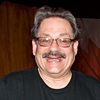Home » Jazz Articles » Multiple Reviews » Ivo Perelman: The Art of the Improv Trio
Ivo Perelman: The Art of the Improv Trio
 For the last few centuries, the avant-garde movement has taken for itself the role of challenging preconceived notions of what is acceptable in music, in poetry, in the visual arts. This challenge has, for the most part, consisted of violating accepted rules in order to provoke discussion about the validity of those norms.
For the last few centuries, the avant-garde movement has taken for itself the role of challenging preconceived notions of what is acceptable in music, in poetry, in the visual arts. This challenge has, for the most part, consisted of violating accepted rules in order to provoke discussion about the validity of those norms. In the arena of serious music, we've progressed, as it were, from the highly structured world of Baroque and Romantic symphonic music to modern composers such as Bartók and the semi-improvised music of swing, to the completely deconstructed world of free jazz and John Cage.
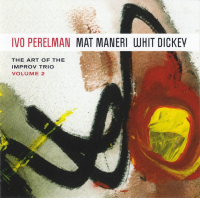 But today's free jazz is pretty much where free jazz—and unstructured music of any kind (because, really, is there any difference between the "jazz" of Art Ensemble of Chicago and the "pop" of Yoko Ono?)—was in 1968.
But today's free jazz is pretty much where free jazz—and unstructured music of any kind (because, really, is there any difference between the "jazz" of Art Ensemble of Chicago and the "pop" of Yoko Ono?)—was in 1968. By the late 1960s, we had arrived at a point of complete rejection, or at least abandonment, of form—and there's no further deconstruction to be had. Much as with free verse in poetry (where meter and structure have been discarded) or modern art (spray anything you like on the canvas, if you must use canvas), the avant-garde in music is in a stylistic cul de sac and has been for half a century.
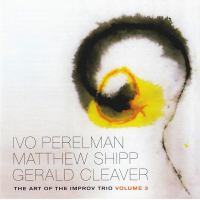 There's nothing left against which to rebel.
There's nothing left against which to rebel. As author Tom Wolfe pointed out in 1975's The Painted Word, his delightful and brilliant deconstruction of deconstructionism, art (and music) critics have embraced abstract and post-abstract forms as a means of increasing their (our) own importance. No longer mere announcers of new works or creators on the scene (new show opening at such and such gallery; new album from new artist on such and such label), abstract and latter forms require an interpreter to explain each work to consumers.
These thoughts were brought to mind while listening to saxophonist Ivo Perelman's new six-album improvised collection, The Art of the Improv Trio.
It's an ambitious work, six different sessions with six different lineups, each a 40-to-60 minute exercise in collaborative improvisation.
But listening to this collection invoked in this listener a reaction of "now what?" There was nothing here that hasn't been done before.
Now, one could say the same thing about swing revival, Dixieland or Chicago blues.
But the entire point of the contemporary avant-garde—with its rejection of melody and structure, its embrace of atonality and dissonance—isn't about creating something beautiful, it's about forcing the rest of us to reappraise our assumptions.
That seems a goal unlikely to be achieved using the same approach that's been used for the last 50 years.
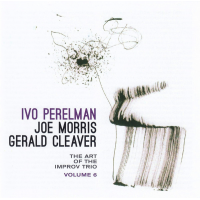 The ability to shock via breaking the rules is long gone. The possibility of gaining attention through outrageousness is diminished by our increasing numbness borne by overexposure.
The ability to shock via breaking the rules is long gone. The possibility of gaining attention through outrageousness is diminished by our increasing numbness borne by overexposure. Perelman's new collection isn't completely unstructured music—even if his lead saxophone playing is largely devoid of melody. While his leads seem to be wholly improvised, with no overriding melodic structure to any of the tracks, no extrapolations on an existing theme, the accompanying musicians and drummers mostly complement Perelman's lead, whether it's comping in the same key or providing a sympathetic rhythm behind his blowing.
Still, it is far closer to chaos than it is to anything resembling structure. Perelman's tenor playing is often in the upper registers of the instrument's capabilities, and he regularly invokes whistles and screeches and broken notes.
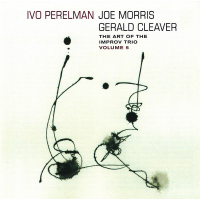 Spontaneously composed music doesn't have to be dissonant or atonal; Keith Jarrett has made a career of creating beautiful music on the fly. But what is heard on these tracks isn't exactly Beethoven or Gershwin. These six albums contain music that is not too different from what you might get by writing a computer program to play random notes of varying lengths across a range of volumes. It is not a particularly musical experience, and it is difficult to imagine listening to these releases more than a few times (or even remembering whether it was "Part 2" from Volume 2, or "Part 2" from Volume 5 you wanted to revisit).
Spontaneously composed music doesn't have to be dissonant or atonal; Keith Jarrett has made a career of creating beautiful music on the fly. But what is heard on these tracks isn't exactly Beethoven or Gershwin. These six albums contain music that is not too different from what you might get by writing a computer program to play random notes of varying lengths across a range of volumes. It is not a particularly musical experience, and it is difficult to imagine listening to these releases more than a few times (or even remembering whether it was "Part 2" from Volume 2, or "Part 2" from Volume 5 you wanted to revisit). 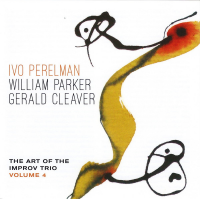 Those who simply enjoy the unbounded freedom of free jazz may well enjoy this collection. It is energetic, and the varying lineups—with piano, viola, bass and guitar joining Perelman's tenor sax, and drums—provide different sonic palettes. (The extended duo interplay between drummer Gerald Cleaver and bassist William Parker on "Part 3" of Volume 4 is particularly engaging, albeit far more structured than anything else heard on this collection.)
Those who simply enjoy the unbounded freedom of free jazz may well enjoy this collection. It is energetic, and the varying lineups—with piano, viola, bass and guitar joining Perelman's tenor sax, and drums—provide different sonic palettes. (The extended duo interplay between drummer Gerald Cleaver and bassist William Parker on "Part 3" of Volume 4 is particularly engaging, albeit far more structured than anything else heard on this collection.) But the average jazz listener new to free jazz will find this to be confusing cacophony, and is likely to be left wondering what all the fuss was about.
Tracks and Personnel
The Art of the Improv Trio: Volume 1
Tracks: Part 1; Part 2; Part 3; Part 4; Part 5; Part 6.
Personnel: Ivo Perelman: tenor saxophone; Karl Berger: piano; Gerald Cleaver: drums.
The Art Of the Improv Trio: Volume 2
Tracks: Part 1; Part 2; Part 3; Part 4; Part 5; Part 6; Part 7; Part 8; Part 9; Part 10; Part 11; Part 12; Part 13.
Personnel: Ivo Perelman: tenor saxophone; Mat Maneri: viola; Whit Dickey: drums.
The Art Of the Improv Trio: Volume 3
Tracks: Part 1; Part 2; Part 3; Part 4; Part 5; Part 6; Part 7; Part 8; Part 9.
Personnel: Ivo Perelman: tenor saxophone; Matthew Shipp: piano; Gerald Cleaver: drums.
The Art Of the Improv Trio: Volume 4
Tracks: Part 1; Part 2; Part 3.
Personnel: Ivo Perelman: tenor saxophone; William Parker: bass; Gerald Cleaver: drums.
The Art Of the Improv Trio: Volume 5
Tracks: Part 1; Part 2; Part 3; Part 4; Part 5; Part 6; Part 7; Part 8; Part 9.
Personnel: Ivo Perelman: tenor saxophone; Joe Morris: electric guitar; Gerald Cleaver: drums.
The Art Of the Improv Trio: Volume 6
Tracks: Part 1; Part 2.
Personnel: Ivo Perelman: tenor saxophone; Joe Morris: bass; Gerald Cleaver: drums.
Tags
PREVIOUS / NEXT
Support All About Jazz
 All About Jazz has been a pillar of jazz since 1995, championing it as an art form and, more importantly, supporting the musicians who make it. Our enduring commitment has made "AAJ" one of the most culturally important websites of its kind, read by hundreds of thousands of fans, musicians and industry figures every month.
All About Jazz has been a pillar of jazz since 1995, championing it as an art form and, more importantly, supporting the musicians who make it. Our enduring commitment has made "AAJ" one of the most culturally important websites of its kind, read by hundreds of thousands of fans, musicians and industry figures every month.




